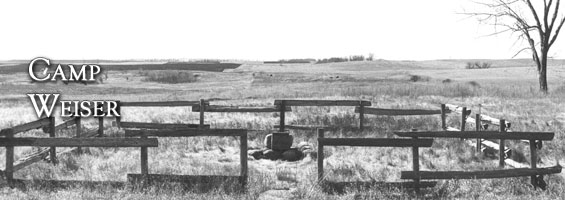We’ve launched a new web portal! Visit findhistory.nd.gov to search our collections.
Due to a road closure, the Killdeer Mountain Battlefield State Historic Site is temporarily closed.

Please note: This site is currently inaccessible due to high water levels covering and washing out the road.
A small granite marker enclosed by a split rail fence identifies this site as the approximate location of the July 13 campsite of the Sibley expedition. It was named for Regimental Surgeon Dr. Josiah Weiser, 1st Minnesota Mounted Rangers, who was later killed at the Battle of Big Mound (see Big Mound Battlefield and Camp Whitney). Camp Weiser is located six miles southeast of Kathryn, Barnes County.
On July 13, 1863, the troops arose at 2:30 a.m. to leave Camp Wharton and march northwest toward Devils Lake. Unlike the scorching days that preceded, the weather was cool and cloudy. After marching twelve miles, the leading units began making camp at about 10:00 a.m. by a beautiful cluster of freshwater lakes. The lakes, larger than many they had seen in this country, provided good protection on three sides and held an abundance of frogs, a culinary treat for the men. There were also many ducks and geese, but an order prohibiting the discharge of firearms precluded hunting waterfowl.
Late in the afternoon, the cavalry arrived in camp with the weakened horses and mules that had been left behind at previous camps to recuperate from dehydration and heat exhaustion. By 9:00 p.m. a herd of some 140 cattle that had strayed thirty miles from camp were rounded up. Finally, the camp settled down for a few hours’ respite before the next day’s march.
Access is limited by road conditions, and there are no visitor services or interpretation at Camp Weiser State Historic Site.
SHSND Address:
612 East Boulevard Ave.
Bismarck, North Dakota 58505
Get Directions
SHSND Hours:
Museum Store: 8am - 5pm M-F; Sat. & Sun. 10am - 5pm.
State Archives: 8am - 4:30pm., M-F, except state holidays, and 2nd Sat. of each month, 10am - 4:30 pm.
State Historical Society offices: 8am - 5pm M-F, except state holidays.
Contact SHSND:
phone: 701.328.2666
email: history@nd.gov